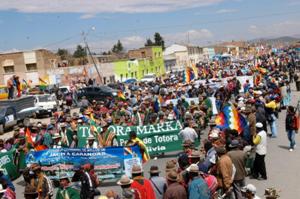
Broad bean crops destroyed by a new type of slug
Bolivia is one of the world’s smallest contributors to the emissions
which cause climate change. It is responsible for 0.04% of global carbon
emissions compared to the UK’s 1.87%. Yet the effects of climate change
are already a reality in Bolivia. This has led Bolivia to play an
increasingly forceful and prominent role in international climate change
negotiations.
The impacts of climate change in Bolivia
There are environmental and social impacts of climate change across
Bolivia’s diverse regions from the Andean highlands to the Amazonian
lowlands. It is the communities that are already in situations of
poverty and vulnerability that are feeling the effects hardest. Five of
the main impacts of climate change are: food insecurity; glacial retreat
and water availability; natural disasters; diseases and forest fires.
Rises in near-surface temperatures have tripled since the mid 1970s.
This has led to rapid glacial melt in the Bolivian Andes. In the
Cordillera Real, the country’s main mountain chain, glaciers have
decreased by 40% of their total volume from 1975 to 2006. This has
significant effects on water supply as well as electricity produced by
hydropower. The Tuni Condoriri glacier, which provides the water supply
for Bolivia’s administrative capital La Paz and the neighbouring city of
El Alto (together accounting for around 2 million people), is expected
to disappear partly by 2025 and fully by 2045.
Climate change is affecting the frequency and severity of extreme natural events such as flooding and forest fires. In the Amazonian lowlands flooding has become
more frequent and its effects increasingly widespread. Flooding between
2006 and 2008 affected over 1 million people in a region where 32% of
people live in poverty and are particularly vulnerable to natural
hazards. Meanwhile forest fires - caused by drought - have also become
more severe. In the Amazonian departments in 2010 fires affected 1.5
million hectares of land.
Increases in temperatures have had health implications. Certain types of
mosquitoes have adapted to living at altitudes above 2,600m, leading to
increased risk of contracting diseases. Cases of malaria have been
identified for the first time in the highland city of Oruro.
In the longer-term one of the main concerns is food insecurity. Changing
temperatures, increasing irregularity of seasons and overall
unpredictability of weather have significant implications for food
production. Whilst the changes vary according to region and climate,
small producers and subsistence farmers are worst affected. In 2010
sudden drops in temperature and drought resulted in the death of
livestock and reduction of crops which affected 21,000 families in the
Amazon departments. In 2011 climatic instability caused Bolivian quinoa
yields to drop 50% compared with the previous year.
Livelihood insecurity will also affect migration patterns. Migration has
always been a way of sourcing alternative incomes in the Andes where
agricultural cycles are dictated by dry and rainy seasons. It’s hard to
identify climate change as the cause of migration as decisions to move
are often complex, however, the effect of environmental instability on
livelihoods is likely to be a strong factor. In Norte Potosi, a region
in which 71% of the land is affected by desertification, recent research
indicates that migration is becoming more widespread. On average 15% of
communities’ populations in the area migrate each year, though in some
communities the rate is as high as 50%.
In the face of environmental and socio-economic adversity Bolivian
people are responding and adapting to climate change constructively.
Bolivian Climate Change Platform
The Bolivian Climate Change Platform is led by the Secretaries of
Natural Resources of the five main Bolivian social movements who
collectively represent over three million people. They receive technical
support and funding from Bolivian and international non-governmental
organisations. The Platform was founded in 2009 as it was recognised the
country was being increasingly affected by the impacts of climate
change. The aim of the Platform is to develop proposals to combat
climate change through national policies in Bolivia and proposals for
international action.
At the national level, the Platform has been active in promoting the Law
of Mother Earth. The law is based on a proposal drafted with grassroots
participation from Bolivia's five main social movements. The overall
aim of the law is to transition towards a model of living in harmony
with nature by shifting to renewable technologies and applying
indigenous ancestral knowledge in sustainable management of the
environment. The Law establishes mechanisms such as a Ministry of Mother
Earth and an environmental ombudsman to protect environmental rights.
The Secretaries of Natural Resources regularly participate in the UN
climate change negotiations promoting international policies grounded in
indigenous values including the Rights of Mother Earth and based on the
conclusions of the World People’s Conference on Climate Change (see
below).
http://www.cambioclimatico.org.bo/
The World People’s Conference on Climate Change (WPCCC) - Bolivia, April 2010
Called in response to the perceived inadequacy of the 2009 UN Conference
in Copenhagen, the World People’s Conference took place in the Bolivian
city of Cochabamba and coincided with Mother Earth Day on 22 April
2010. The indigenous concept of vivir bien – living well and in harmony
with one another and nature (as opposed to living better than and in competition with others) - was prominent within the ethos and approach of the conference.
The conference brought together 35,000 people (of which 9,000 were from
outside Bolivia) from social movements, governments, scientists and
academics. Discussions went beyond the impacts and effects of climate
change to identifying its structural causes.
The results of the conference were presented and collated into a
document entitled the “People’s Agreement”. The Agreement calls for
emissions to be reduced so that the world’s average temperature is only
increased by a maximum of 1 degree Celsius. To account for developed
countries’ historical responsibility and the climate debt they have
accrued it suggests that they should give 6% of their respective GDPs to
climate adaptation funds. These would be managed by national
governments at the UN, not the World Bank. There were more detailed
proposals for specific areas such as sustainable agriculture and
forestry; technology transfer; supporting those who are forced to
migrate due to climate change; the need for an International Climate and
Environmental Justice Tribunal and a Universal Declaration of Mother
Earth’s Rights.
UN negotiations
The Bolivian government has taken a strongly principled position in the
UN climate change negotiations, taking its policy line from the
conclusions of the WPCCC. The Bolivians have pushed for a binding,
ambitious and justice-based agreement from the discussions, often
putting it at odds with industrialised countries which have proposed
more pragmatic, less ambitious outcomes.
The Bolivian government has been successful in gaining recognition for
access to water as a human right at the United Nations and is also
pushing for the approval of the Universal Declaration of Mother Earth’s
Rights.
|



